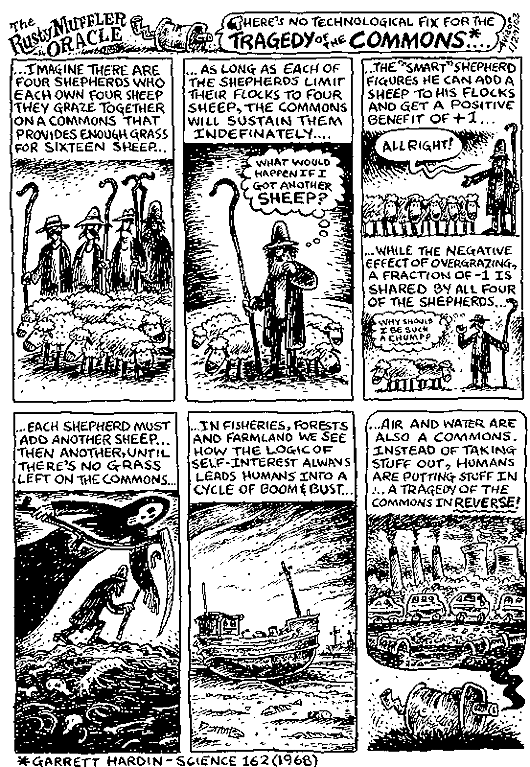Today I would like to tell you another story, a sad one. Have you ever heard about open access fisheries? Maybe, but in case not I'll explain: an open access fishery is an absolutely 'democratic' fishery, one where everyone who wants to fish and has a boat can do it, without having to ask anyone for permission. It surely sounds nice and fair, natural resources should have no proprietaries and ownership should remain in the people. However, we all know that this system, though apparently fair, is almost always unsustainable and could easily result in the collapse of a fishery. This open acces situation is not exclusive to fisheries, it affects all natural resources, everywhere in the world (think for example in the deforestation of the Amazon). What might not be so obvious is why this system eventually could lead to such unpleasant results, and that's what I will try to explain.
The idea goes something like this: in an open access fishery, every fisherman can take all the fish he wants. The ammount of fish is limited and as such, the fishery can only support so many fishermen before going down into the pits of collapse, so if all the fishermen agree to catch only enough fishes to keep everything running, the fishery would sustain itself 'forever' and everyone will live "happily ever after". Of course, this doesn't happen. In the real world we have fisheries where people fish more than they should, even if they know that by doing so, they will harm everyone in the process, themselves included. This behaviour, even if it is evidently self-destructive, is quite common anywhere, and it has a reasonable explanation.
In 1968, Garrett Hardin published in Science an influential paper on this very subject titled The Tragedy of the Commons. This paper was very controversial (read it and you'll know why), but it stated clearly how the natural outcome for common access natural resources is depletion. Look, I found this comic strip which explains the idea very well:
 (I took it from here)
(I took it from here)As you can see in the pic, since individuals have no ownership of the resource, the only way they can guarantee to get a fair share is either to agree to hold resource utilization at a certain level (which, let's face it, hardly works) or to exploit it harder, since if they don't do it, someone else will do it for them. Saddest part? there is no solution for this dilemma, any open access system will eventually lead to disaster.
Bottomline, since the open access dilemma has no technical answer, we have to resort to the other option: resource ownership. It might not be "democratic" but you just saw what happens when things go "democratic". How do we do this? I'll explain it in my next post.
No comments:
Post a Comment